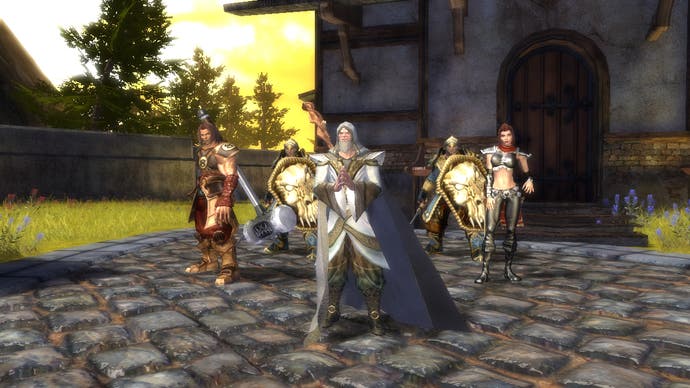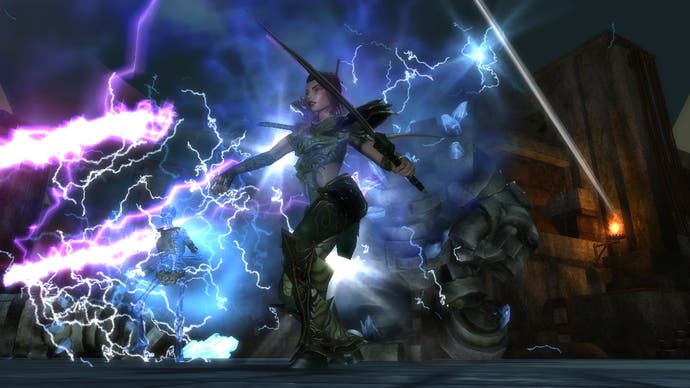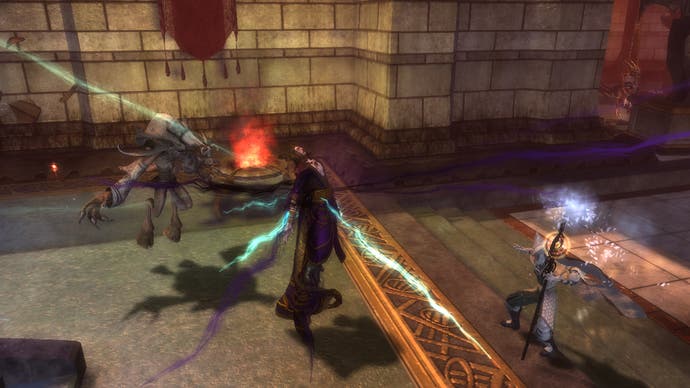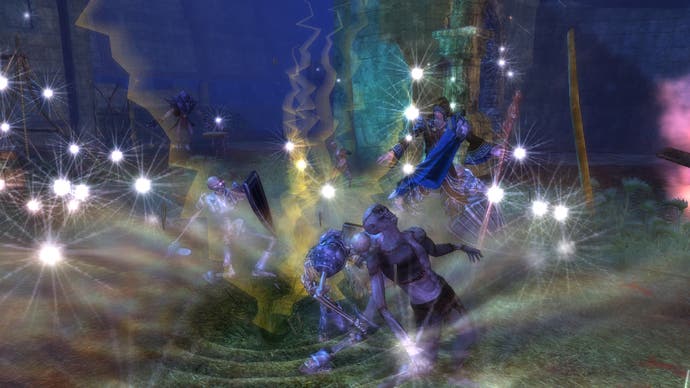Untold Legends: Dark Kingdom
Untold hours of level grinding.
Untold Legends: Dark Kingdom is pretty much exactly the same game you've played as Diablo, or Baldur's Gate Dark Alliance, or Champions of Norrath. Yes, it's one of those games that require you to repeatedly press or click a button to thrash your way through thousands of bad guys you view from an isometric camera angle.
It's the sort of game that cobbles together every cliché imaginable into a game that's so by the numbers you could probably use it to teach small children to count. It's got a whole host of our old friends: spiders, skeletons, a hot Amazonian vixen, you rotate crystals to redirect beams, you trawl through dismal sewers, and has the sort of button-bashing level grinding that's the defining feature of every button-bashing level-grinding action RPG ever. It's not likely to be the first game you'll want to play on the PS3, put it that way.

You start the game by choosing from a Warrior, Mage or Scout. They each look very different, (one's a burly male, one's a buxom female, and one's an old bloke with a staff); but in game terms, they're barely distinguishable from each other at the start of the game, and barely more barely distinguishable as their powers expand over the course of the game. Take the Scout, for example: "As the most agile member of the unit, she uses stealth and deception to vanquish her enemies", runs her character description. A more accurate one might simply say: "hammering the square and cross buttons make her hit everything till it's dead." Sure, about 12 hours into the game you might start having to fall back on some of her special abilities, but really, that's the essence of the game: button mashing through each successive wave of enemies to grind your way up to the next level so you can give your character a few extra points of health, or some increased attack power.
The game sets its stall out early, with a tutorial of sorts that teaches you how to hit square and cross to hit everything till it's dead. And then carries on in exactly the same manner for about 15 to 20 hours: wander down a linear path and bash things 'til they're dead.

On a purely technical level, the game is a disappointment. It looks pretty enough, without ever really making the PS3 break sweat, but has a camera that renders the game almost unplayable at times. Getting stuck on scenery is so last gen. The dodgy collision detection (which resulted in sudden death after failing to complete one of the game's simple sewage puzzles) went out of fashion a couple of generations ago. Combined with some floaty handling, it makes the platform sections that are introduced several hours into the game pretty tedious.
Equally tedious are the game's boss battles. They start out as slightly larger enemies who you overcome by hitting the square or cross buttons slightly more often to smash them to bit 'til they're dead. As the game goes on, however, things get slightly more complicated and you have to throw things at them, or destroy some pillars next to them, or kill them again after they mutate a couple of times. The same sort of thing you'll have seen about a million times before.

The cut-scenes seem half finished while driving forward a narrative that's half-baked at best: it's all Kingdom of Dureth this, Barbarian Lands that, and involves a king who goes mental and evil because he's corrupted by the forces of evil (apparently the big evil statues outside the palace and the king's pale-skinned heroin chic look didn't alert anyone until it was too late). The dialogue is that unique mangling of syntax that's native to most North American imaginings of pre-industrial fantasy settings. It's the sort of thing that's been served up in countless hundreds of Dungeons and Dragons modules and New York Times best-sellers over the years: all ‘mayhap' and ‘this be', with characters declaring things like, "I am foresworn to end this tragedy."
The rousing and operatic score (performed by the Prague Philharmonic Orchestra, apparently) is pretty impressive, but it starts to feel a bit relentless after a while, and frequently serves to highlight the lack of drama served up elsewhere. A more serious flaw is that the game doesn't really provide enough incentive to put yourself through its rudimentary level grind. There's nothing intrinsically wrong with the button-bashing level-grinding action RPG genre. Games like Baldur's Gate: Dark Alliance or Marvel Ultimate Alliance have demonstrated how to do it well: provide enough interesting abilities, new environments, or equipment upgrades at just the right time to sustain the player's interest until the end of the game. Dark Kingdom, by contrast, never really opens up any inspiring new abilities, and item upgrades don't ever really vary in nature from those available at the start of the game.

Which isn't to say it's totally devoid of any merit. It is, in its own predictable way, mildly addictive - partly because of the slickness of the button-bashing combat, and partly because it's so forgiving for the first umpteen hours. Vanquished foes leave orbs that replenish your health, mana, and essence, (which is used to upgrade equipment at shrines), and that means that it's easy to progress through the game. So while the rewards are uninspiring, you're never too far from the next one. And there's an online multiplayer mode, which is always fun with friends - if you can find any willing to part with the cash to buy this.
It's a game that, like other examples of the genre, is utterly simplistic, and little more than a carefully engineered route down the reward pathway of the player's brain. It's just that, unlike other examples of the genre, it's not quite as successful as navigating that pathway. It's mildly addictive in the same way that, say, downloading your emails is, or constantly hitting refresh to update a messageboard. Which is to say, it passes the time, without ever really requiring you to use your brain much. But equally, it doesn't really add much to the sum of humanity and at the end of it you may wonder why you bothered.







